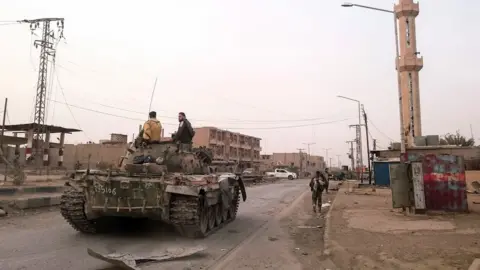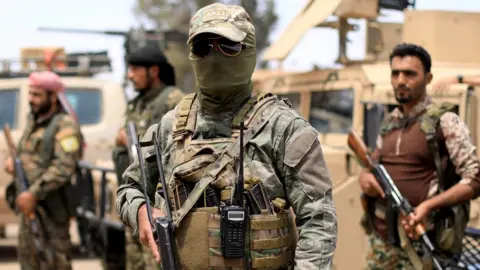Syria war: Iraqi militias blame US for deadly border strike
 AFP
AFPAn Iraqi paramilitary force has accused the US-led coalition against the Islamic State (IS) group of killing 22 of its fighters in an air strike in eastern Syria.
However, the coalition says it did not carry out any strikes and US officials say that Israel is to blame.
The Israeli army has not commented on the attack.
Syrian state media had earlier reported that the coalition had hit pro-government forces, causing casualties.
Iraq's Popular Mobilisation said missiles hit one of its positions on the Iraqi-Syrian border overnight.
The paramilitary force is led by Iran-backed Shia Muslim militias and is itself fighting IS.
On Monday morning, Syria's state-run Sana news agency cited a Syrian military source as saying coalition aircraft had bombed one of its positions in al-Huri, a village about 3km (2 miles) south-east of Albu Kamal and 1.5km north-west of the Syrian-Iraqi border crossing.
The source did not give any precise casualty figures, saying only that a number of people had been killed and others wounded.

The Syrian Observatory for Human Rights, a UK-based monitoring group, said it had documented the deaths of 52 people, including 30 Iraqi and 16 Syrians.
Later, the Popular Mobilisation issued a statement alleging that a US aircraft had fired two guided missiles at one of the force's fixed positions about 700m (2,230ft) from the border at 22:00 (19:00 GMT) on Sunday, killing 22 fighters.
The force said its fighters were deployed inside Syrian territory because of the local geography and the need to prevent breaches of the frontier by IS militants, and stressed that the Syrian government and Iraqi military knew of their presence.
A coalition spokesman said it was aware of the reports, but denied that there had been any strikes by its forces on the Albu Kamal area on Sunday night.
Allow X content?
The coalition and the Popular Mobilisation have supported Iraqi government forces battling IS since 2014, when the jihadist group seized control of large parts of northern and western Iraq.
The coalition has also helped an alliance of Syrian Kurdish and Arab fighters - the Syrian Democratic Forces (SDF) - drive IS out of much of north-eastern Syria.
They have tried to avoid clashing with Syrian pro-government forces also fighting IS in the region with the support of Russia and Iran, but there have been serious incidents in recent months.
In February, at least 100 pro-government fighters - many of them Russian mercenaries - were killed in strikes carried out by US forces in response to what they said was an attack on an SDF headquarters on the western side of the River Euphrates, which serves as an informal demarcation line.
 Reuters
ReutersIn a separate development on Monday, Turkey said its troops had started carrying out patrols in an area around the northern Syrian town of Manbij, as part of a deal struck with the US in an effort to ease tensions in the border region.
Manbij was held by IS militants until they were driven out by the SDF in 2016. But Turkey's government regards the Kurdish militia that dominates the alliance, the People's Protection Units (YPG), to be an extension of an outlawed Kurdish rebel group it has fought for decades, the Kurdistan Workers' Party (PKK).
Ankara and Washington eventually reached an agreement under which the YPG withdrew from Manbij, and a Turkish military presence there became possible.
